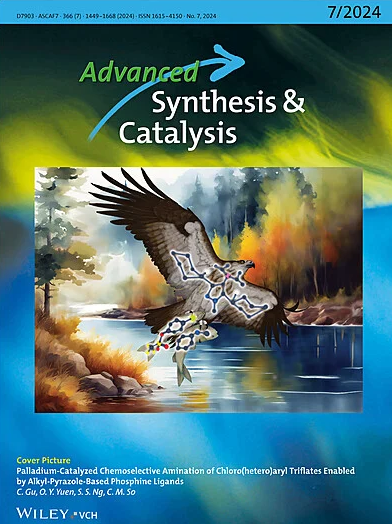5,7‐Membered Cyclometallated Gold(III) Complexes with Pyridine‐Phenyl‐Oxazoline N^C^N Ligands as Catalysts for Organic Transformation Reactions Under Silver‐Free Conditions
IF 4
2区 化学
Q2 CHEMISTRY, APPLIED
引用次数: 0
Abstract
A series of 5,7‐membered cyclometallated gold(III) complexes with N^C^N tridentate ligands are developed as catalysts, which are prepared via transmetalation of pyridine‐phenyl‐oxazoline ligand‐containing organomercury compounds with potassium gold(III) chloride (KAuCl4) with up to 86% yields. Investigation on the synthesis and catalytic activity of the newly developed gold(III) complexes under silver‐free conditions results in >90% conversion for propargylamines and up to >99% conversion for bifunctional modification of oligosaccharides via three‐component (A3)‐coupling reactions. Employment of the tridentate gold(III) complexes also successfully catalyzes the carboalkoxylation reaction of acetal alkynes. These results reveal potential applications of such 5,7‐membered tridentate gold(III) complexes as catalysts for organic transformation reactions and modification of biomolecules.

吡啶-苯基-恶唑啉N^C^N配体的5,7元环金属化金(III)配合物在无银条件下作为有机转化反应的催化剂
以含吡啶-苯基-恶唑啉配体的有机汞化合物与氯化金(III)钾(KAuCl4)为催化剂,制备了一系列含N^C^N三齿配体的5,7元环金属化金(III)配合物,产率高达86%。研究了新开发的金(III)配合物在无银条件下的合成和催化活性,结果表明丙胺的转化率为90%,通过三组分(A3)偶联反应对低聚糖的双功能修饰的转化率高达99%。三齿金(III)配合物的使用也成功地催化了缩醛炔的碳烷氧基化反应。这些结果揭示了这种5,7元三齿金(III)配合物作为有机转化反应和生物分子修饰催化剂的潜在应用。
本文章由计算机程序翻译,如有差异,请以英文原文为准。
求助全文
约1分钟内获得全文
求助全文
来源期刊

Advanced Synthesis & Catalysis
化学-应用化学
CiteScore
9.40
自引率
7.40%
发文量
447
审稿时长
1.8 months
期刊介绍:
Advanced Synthesis & Catalysis (ASC) is the leading primary journal in organic, organometallic, and applied chemistry.
The high impact of ASC can be attributed to the unique focus of the journal, which publishes exciting new results from academic and industrial labs on efficient, practical, and environmentally friendly organic synthesis. While homogeneous, heterogeneous, organic, and enzyme catalysis are key technologies to achieve green synthesis, significant contributions to the same goal by synthesis design, reaction techniques, flow chemistry, and continuous processing, multiphase catalysis, green solvents, catalyst immobilization, and recycling, separation science, and process development are also featured in ASC. The Aims and Scope can be found in the Notice to Authors or on the first page of the table of contents in every issue.
 求助内容:
求助内容: 应助结果提醒方式:
应助结果提醒方式:


